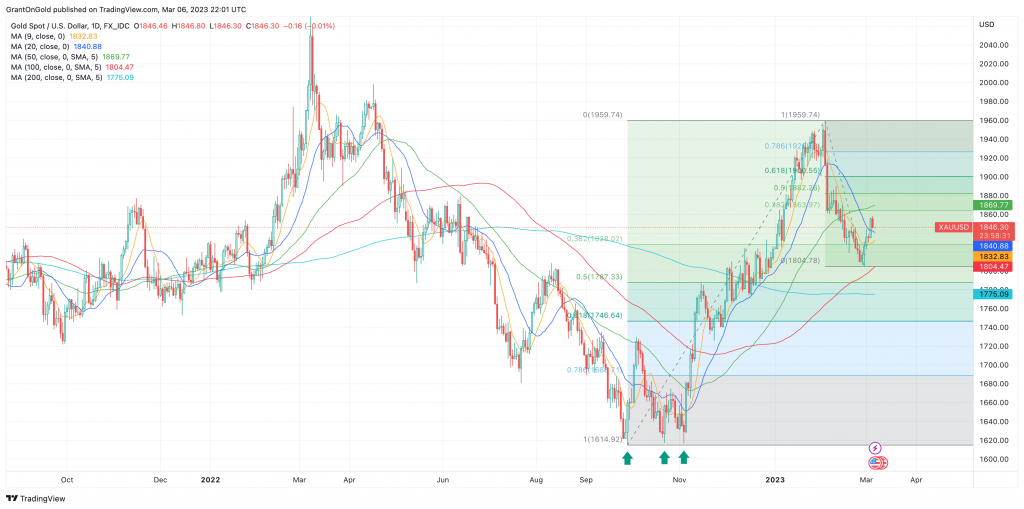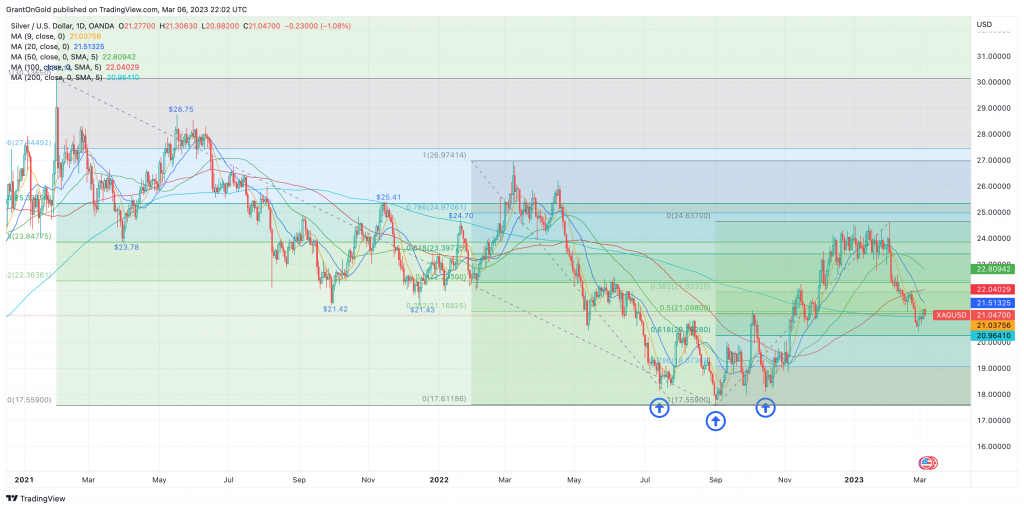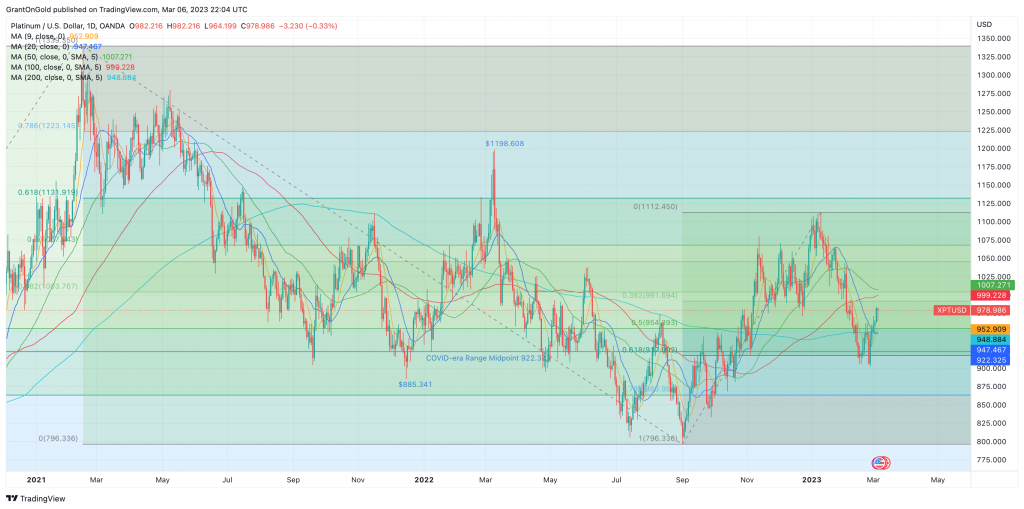Gold ended last week with a gain of 2.5%. It was the first higher weekly close in 3 weeks.

The outside week (lower low, higher high) has some bullish technical implications, but the market failed to generate any upside follow-though on Monday. Traders are exhibiting caution ahead of Fed Chairman Powell’s testimony this week before Congress, and February jobs data that comes out on Friday.
While Powell is likely to highlight recent successes in tempering inflation, higher prices in January will likely prompt him to reiterate the need for ongoing tight monetary policy. Markets will hope to hear some optimism about Fed efforts to orchestrate a soft landing.
Much of that optimism stems from persistent strength in the jobs market, particularly after the huge payrolls beat in January. Median expectations for February nonfarm payrolls are +223k. That’s less than half of January’s payrolls increase of 517k, but still a pretty respectable number.
Powell’s tenor and the jobs report should set gold’s short-term tone heading into the next FOMC meeting on March 21-22. While a 25-bps hike is still favored (68.6%), the probability for a 50-bps hike continues to edge higher, and now stands at 31.4% versus 24% last week.
The gold market’s focus remains squarely on the ebb and flow of monetary policy expectations, and the resulting movements in interest rates and the dollar. However, if it becomes evident that rate hikes alone can’t contain inflation, gold may rally on flight to quality in anticipation of stubborn inflation and heightened risks of a recession.
The bulls continue to pay considerable attention to feverish central bank gold demand, which reached a record 1,136 tonnes in 2022. This year is off to a good start with 31 tonnes of gold purchased by central banks in January. Turkey and China were notable buyers.
Reserve diversification, primarily out of dollars and Treasuries, appears to be the primary motivation for this gold buying. The rise in the use of sanctions also has many countries concerned about the liquidity of their reserve assets so they are shifting to something that is supremely liquid and tends to perform well in times of economic and geopolitical uncertainty.
Individual investors should consider following their lead.
Silver
Silver rebounded 2.5% last week, ending the string of lower weekly closes at six. While a simple hook reversal is evident on the weekly chart, the lack of upside follow-through on Monday suggests the downside remains vulnerable.

Like gold, silver adopted a consolidative tone on Monday as the markets eagerly await Powell’s initial testimony before the Senate Banking Committee on Tuesday. He’ll be back on the Hill on Wednesday to testify before the House Financial Services Committee. After that, the focus will shift to Friday’s jobs report.
Silver is likely being weighed to some degree by disappointment that China failed to announce a major stimulus program at the beginning of the National People’s Congress in Beijing.
China is targeting “around 5%” growth in 2023 but will apparently rely on a consumer-driven rebound. That’s only a modest increase over the 3% growth seen in 2022, which was the lowest GDP reading since 1976.
There are worries that without an influx of stimulus, Chinese consumers will remain cautious. Demand for consumer electronics and electric vehicles – which contribute significantly to silver demand – would likely remain soft.
Kitco reported on Monday that for the first-time auto manufacturers were at the BMO Global Metals, Mining, & Critical Minerals Conference. The implication is that auto companies might be interested in making moves to bolster their supply chains. That could include buying silver mines.
“If I were Elon Musk, I’d be very active in this area.” – Keith Neumeyer of First Majestic Silver
Neumeyer cited Silver Institute data that projects a 200 Moz deficit in the silver market this year, driven largely by heightened demand from both the auto and solar sectors. He went on to project a silver price north of $100 in the medium to long term.
PGMs
Platinum surged 8.3% last week, snapping a 7-week losing streak. A key reversal formed on the weekly chart, suggesting potential for short-term tests back above $1000.

We may see some consolidation ahead of Powell and the jobs data, and the lack of Chinese stimulus does not help the bullish cause. However, a better technical picture has developed.
Palladium remains defensive just off the nearly-3½-year low set late in February at $1353.04.
Non-Reliance and Risk Disclosure: The opinions expressed here are for general information purposes only and should not be construed as trade recommendations, nor a solicitation of an offer to buy or sell any precious metals product. The material presented is based on information that we consider reliable, but we do not represent that it is accurate, complete, and/or up-to-date, and it should not be relied on as such. Opinions expressed are current as of the time of posting and only represent the views of the author and not those of Zaner Metals LLC unless otherwise expressly noted.